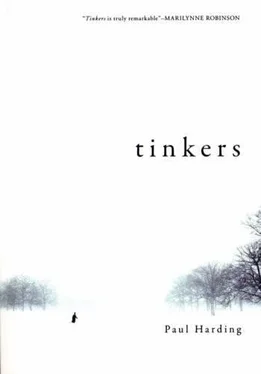His face was pale. It no longer showed expression. True, it showed a kind of peace, or, more precisely, seemed to predict that peace, but such peace was not a human one. It captured breath and let breath escape in fluttery little gasps and sighs. It no longer reacted to light. Shadows passed over it and it merely registered their angles, registered the pilgrimage of the day by their lengths. Certainly, George's family did not allow the direct glare of the rising or setting sun to fall upon his face, but their adjusting of curtain and shade was a palliative for themselves, for living eyes and living skin, and had nothing to do with the vision of their husband, brother, father, grandfather lying on the hospital bed. Human consideration was no longer to be his, for that consideration could be expressed now only by providing physical comfort, and physical comfort was as meaningless to him (to it, for that was what lay before his family now-the it formerly he-at least to the extent that the he, although still figured by the struggling, fading, dying it, was plumbing depths far, far from that living room filled with a weeping sister and daughters and wife and grandchildren and the it merely maintaining a pantomime of human life), was as meaningless to him now as it would have been to one of his clocks, laid out in his place to be dusted and soothed with linseed oil, fussed over and mourned even before it was was (because that is how the living prepare, or attempt to prepare, for the unknowable was-by imagining was as it is still approaching; perhaps that is more true, that they mourn because of the inevitability of was and apply their own, human, terrors about their own wases to the it, which is so nearly was that it will not or simply cannot any longer accept their human grief) as its broken springs wound down or its lead weights lowered for the last, irreparable time.
Thought that he was a clock was like a clock was like a spring in a clock when it breaks and explodes when he had his fits. But he was not like a clock or at least was only like a clock to me. But to himself? Who knows? And so it is not he who was like a clock but me.
***
Two things happened in 1953: The new interstate highway opened and Howard's second wife's mother fell sick in Pittsburgh. Megan told him he could not go with her to Pittsburgh. Mother was the strictest of Catholics and if she ever found out that her daughter was married to the son of a Methodist minister, any chance she had of recovering from her illness would vanish. Mother would die with her mouth full of curses mingled with my name, she said. This meant he had to spend Christmas alone. Megan baked a banana cream pie and a meat loaf. He walked her to the bus station and helped her onto the four-thirty to Pittsburgh and all points between. She talked the entire time. She opened the bus window to tell him to take the vanilla ice cream out of the freezer fifteen minutes before he had it with the pie, that that made it soft, just like he liked it, and said, I love you. He said, I'll be fine, I'll be fine, still baffled that she had a mother in Pittsburgh. Twenty-five years she had a mother in Pittsburgh.
Five months before, the interstate highway had been finished. It ran in one long line up the eastern seaboard. Immigrants, hobos, manual laborers pounded, carved, blasted, and peeled the earth open through forests, rivers, and gorges, mountains and swamps, then lined the path with good clean gravel, filled it with piping-hot blacktop, rolled it smooth, let it set to cool, and painted a line down the middle. These new superhighways had numbers for names. On the day before Christmas, he put a cold meat loaf sandwich and six bottles of cola in a paper bag, along with his dopp kit, and called his friend from the A &P, Jimmy Drizos. He asked Jimmy if he could borrow his car, an old Ford sedan. Jimmy said, Sure, sure. The in-laws are coming here this year. Sure, sure you can, pal. He took a bus to Jimmy Drizos's house in the Greek part of town. Jimmy was replacing bulbs on strings of lights he had threaded around the iron handrails of the steps to his apartment. Jimmy offered him a drink. He said, No, thanks, Jimmy, no. Jimmy offered him some food to take back home. He said, Thank you, Jimmy, thank you and your wife. Jimmy gave him the keys and a plate of lamb and said, Easy on the clutch, pal. He nodded and pressed the clutch pedal and let the car roll out of the driveway, running in neutral. He shifted the car into first gear and let out the clutch as he pushed the gas pedal. Gears whirred, meshed, then jammed. The car lunged and stalled. Jimmy Drizos looked from his stairs, a colored Christmas bulb in each hand, and yelled, Whaddya', been drinking, pal? and laughed. Howard waved, got the car into gear, and crept away at five miles an hour until he reached the corner, drove over it, turned, and stalled again, this time out of Jimmy Drizos's sight. He spent four hours lurching through the streets of Philadelphia on Christmas Eve, teaching himself to drive. At nine o'clock in the evening, as a light snow started to fall, he drove Jimmy Drizos's Ford onto the highway heading north.
Megan's secret from him was that she had a mother in Pittsburgh. His secret from her was that he had tracked his first family and their migrations throughout New England. He had called post offices to confirm addresses. He called operators and was given new phone numbers. When his son George moved to Enon, Massachusetts, there were two G. Crosbys given by the operator. Howard called the first number. An old woman answered and said, This is Mrs. Gus Crosby. To whom am I speaking? Howard hung up and wrote the second number in his daybook.
Somewhere in Connecticut, he stopped and slept in the backseat of the Ford for four hours. He awoke freezing. He had stopped behind a gas station. He took his dopp kit and used the station bathroom. He brushed his teeth, combed his hair and ran a splash of tonic through it, and shaved with the straight-edge razor his father had given him when he was sixteen and which he still kept sharp enough to cut skin with only the weight of the blade. At noon, he left the highway at exit 24. He took a left and followed Main Street for three miles. He took another left onto Arbor Street and slowed, looking for street numbers on door frames and mailboxes. He came to a small yellow Cape Cod-style house with green shutters. The mailbox at the end of the flagstone walk leading to the front door read GEORGE W. CROSBY. Without turning the engine off, Howard got out of the car, walked up the walkway, and knocked on his son's front door.
Homo Borealis: 1. We kicked the bark off of dead trees and the soft wood beneath was as pale as sawdust and sometimes covered with strange designs that looked like writing that had been drawn into the wood with a stylus or fine-carving tool and the bark then fitted back over the trunk-a rough skin, a splintery hide that protected the secret language. These hieroglyphs we discovered like revelations, like messages someone had left for us alone to discover and to ponder and to poke and scratch at with our sticks but not to understand and to leave like totems for whomever they were actually meant while we crashed away through the bushes. 2. We made up stories about men who had been tattooed with intricate and important instructions. The tattoos were inked into deep layers and the men would be recognized by long, I-shaped scars on their backs, which would have to be recut and the skin opened like a pair of doors to reveal braids of muscle and the secret script. Of course, the men would not know that they were the bearers of these signs. And of course the people who were supposed to read these messages had to go through a very long and difficult process of deciphering obscure clues and directions in order to find these special couriers, in order to protect both the man and the message. The seeker would find the messenger; he would find himself recognizing the messenger as the messenger was trying to sell him an old horse, or serving him breakfast at an inn, or com plaining about politicians during the morning coffee break. 3. Those stories were ignorant. We sensed, finally, the foolishness of attributing the unknown to secret cabals, to conspiracies. Everything was almost always obscure. Understanding shone when it did, for no discernable reason, and we were content. We built our town, then, out of whatever came our way, or whatever we got in the way of, so that we dwelled in huts of hair, in nests of wrappers and tinsel and string, which we looped through nuts and hung from the ceilings with a bit of tape or a piece of old gum because they all had different threads from the bolts we found. Town Hall was constructed of drinking straws (some with elbows, most not) and hubcaps and the foil from cigarette packages. Any number of people lived in the crooks of trees beneath tented Sunday newspapers, which were aged brown by the sun. When it rained, these buildings swelled and then turned to pulp and washed away and the tenants would dry themselves in the sun when it came back out and begin again to collect tin cans and nickels and matchboxes and greasy paper boats that had once held french fries or onion rings. 4. The green sea turned gray and its surface rolled like a membrane. When we dived for shells, it parted for us without resistance and sealed itself behind our up-pointed toes. We felt around, blind, in its slick graphite body, we sifted its sand and came up with smooth stones for our mantles of wind and mist, and whatever of it was held in our hair when we surfaced ran out like quicksilver and rejoined the rest of itself, seamless, molecular, slick, atomic. We traveled in pods. We breached surfaces and caught glimpses of sheer cliffs, columns of flint capped in fir, boreal. We saw beaches of snow and blizzards of sand. 5. When it came time to die, we knew and went to deep yards where we lay down and our bones turned to brass. We were picked over. We were used to fix broken clocks, music boxes; our pelvises were fitted onto pinions, our spines soldered into vast works. Our ribs were fitted as gear teeth and tapped and clicked like tusks. This is how, finally, we were joined.
Читать дальше












